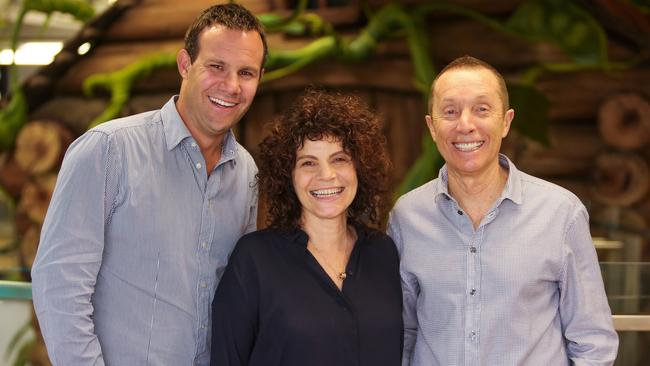Richest 250: The $1bn ship that saved Christmas for Manny Stul and Moose Toys
The billionaire owner of Australia’s global success story had to get creative when his team hit massive issues getting toys from China.

Call it Manny Stul’s billion dollar ship of fortune.
Faced with a logistic crisis as Christmas loomed a few months ago, management at his Moose Toys took things into their own hands to turn from toy maker into supply chain expert.
The business world was grinding to a halt as ships waited to dock at overloaded ports, where trucks banked up waiting to deliver goods to shops where consumer demand for goods was far outstripping supply.
Christmas was looming – the biggest time of year for a toy maker – and Moose had a smash hit on his hands with the award-winning Magic Mixies Magic Cauldron in huge demand in the US in particular.
It just needed to get the product from its factories in China, over to the US and into bricks and mortar stores or the warehouses of e-commerce giants in time.
“Here we were with these huge supply chain issues. They were massive. So we ended up chartering an entire ship for ourselves from China,” the billionaire Moose owner reveals to The Weekend Australian.
“That’s how we were able to get through Christmas. We got the bulk of it through – without that ship it would have been a bloody disaster. We were on tenterhooks. But we got the ship into port, then it was getting [the products] onto trucks to get it into stores, and then getting the stores to accept the delivery because it was absolutely chockablock for them at the time. It was incredible.”
So successful was the strategy that Moose is now on course to hit smash through the $1bn revenue mark for the first time this financial year, after Stul had projected the company to have income of $850m back in November.
“We will hit a minimum of $1bn this year. And the prognosis for next year is even better. Though even given what we did we only were able to ship about 70 per cent of what we wanted to.”
Stul is referring to the Magic Mixies phenomenon that has sales of the interactive toy – that comes with a cauldron, spell book and wand – soaring as it wins a string of “toy of the year” awards in the US and elsewhere.

While Magic Mixies have helped fuel the most recent deal sales boom, Stul says licensing deals with brands such as Bluey, the Octonauts cartoon series and Marvel have helped smooth out revenue peaks and troughs between the rolling out of the company’s hit toys.
“Bluey just keeps getting bigger and bigger in the US,” Stul says. “We could have been doing a lot better, though a lot of companies would say that.”
“Bricks and mortar is going well over in the US now, it is coming back. The Walmarts and Targets of the world are very strong, and they’ve got that online presence now too. So we don’t mind which way they sell them. The online sales have got a lot stronger and really that way of selling is here to stay now. Maybe the percentage will go up and down slightly, but it will remain strong.”
Moose is now one of the biggest and most successful toy companies in the world, built up from its Melbourne headquarters in suburban Moorabbin, where a giant treehouse “grows” through its centre via a beanstalk, next to a restored Douglas DC-3 aeroplane secretly installed over a weekend and used as one of the more unique meeting rooms in an office anywhere.
It has been a remarkable journey for the company owned by Stul, who arrived in Australia with his Polish World War II refugee parents in 1950 and went on to float homewares and giftware company Skansen on the ASX before buying a small, struggling Melbourne toy firm called Moose in 2000 when semi-retired and looking for something to do.
Now led by Stul, a billionaire worth an estimated $1.05bn on The List – Australia’s Richest 250 this year, along with his wife Jacqui Tobias and stepson Paul Solomon.
Moose has also been bedding down its only acquisition, the New Worlds toy company in the UK in 2018 that opened up European markets. It now sells directly in countries such as France and Germany rather than using a distributor, which Stul says means a short-term revenue hit that is later offset by having control over pricing and shipping.
Stul says the record sales result “has made the whole organisation pumped [and] there’s a lot of energy in the company at the moment”, even if most employees have been operating from home in the past two years.
“We’re slowly getting people back under strict conditions, but we’re all feeling very good about the place at the moment,” says Stul.






